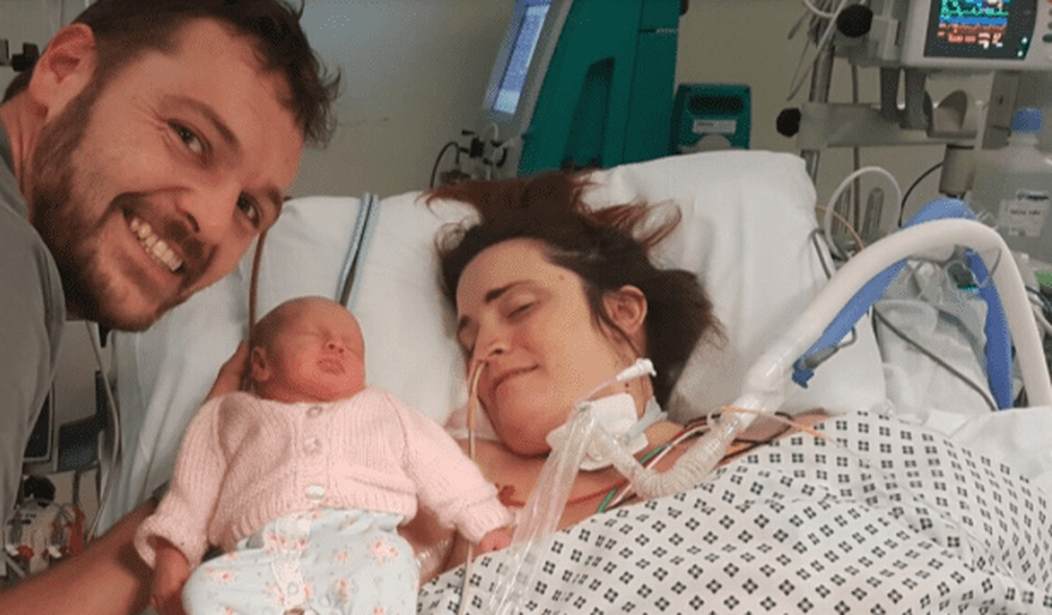London mother Deanne Harry was placed in a medical coma after giving birth to her daughter and suffering from a rare pregnancy condition that nearly took her life.
The 33-year-old mother developed preeclampsia at 36 weeks gestation, which prompted doctors to perform an emergency Cesarean section, according to the Daily Mail. Doctors discovered that her baby, a little girl named Freya, was “suffering from the bacterial infection E. Coli.” Harry was placed in a coma “and underwent a liver transplant to save her life” because her “liver, kidneys, and vital organs started shutting down.” The medically induced coma lasted for 15 days and Harry spent several weeks in the hospital afterward while her daughter underwent extra medical care.
Prior to the delivery, Harry had experienced a normal, healthy pregnancy. After her C-section, she was diagnosed with HELLP syndrome and she is now sharing her story to teach others about the disorder. Friends have launched a crowdfunding page to share her story and raise funds to help the hospital that saved Deanne’s life.
Harry reports that, at birth, her daughter was very small, weighing in at just 4 pounds, 14 ounces. She was placed on the “urgent transplant list” for a new liver and put on life support. Deanne described the horrible ordeal in a social media post: “I was in a life threatening critical condition and everyone around me had to wait to see how I responded.”
Her husband, David, was left with a wife in a coma and a sickly daughter after the December 2016 C-section. The family’s crowdfunding page describes how David’s new role placed him under “extreme stress.” It was so great, in fact, that “few can imagine how difficult this was” for him. Thankfully, baby Freya was released from the hospital after nine days when she was healthy enough to go home. David then faced the uncertainty of a newborn at home and a wife who would remain in a coma for six more days.
After the coma, Deanne woke up “unable to speak and had to communicate to her husband using… lip reading and an alphabet chart, before talking to him through a speaking valve.” She described her progress: “Luckily I am a fighter and have come out the other side but with a long hospital stay and a long recovery process where I had to learn to walk and speak again. I am now on the road to complete recovery.” She credits her friends and family for the support they showed her through this entire process.
According to the March of Dimes, HELLP syndrome is an acronym that stands for:
- H – Hemolysis The breakdown of red blood cells. Red blood cells carry oxygen from your lungs to the rest of your body
- EL – Elevated Liver Enzymes High levels of these chemicals can be a sign of liver problems
- LP – Low Platelet Count Platelets help the blood clot
This syndrome is usually diagnosed in the third trimester, but “may [in rare cases] occur before [then]. It also may begin within 48 hours of delivery, although symptoms may take up to seven days to be evident.”
HELLP syndrome is closely connected with preeclampsia, “but there are times when the symptoms of HELLP will occur without a diagnosis of preeclampsia being made.” Amongst women with preeclampsia, four to twelve percent will develop this syndrome.
Symptoms pregnant women should be mindful of include (as listed here and here):
- Headaches
- Nausea and vomiting that worsen
- Upper right abdominal pain or tenderness
- Visual disturbances, blurry vision
- High blood pressure
- Protein in urine
- Edema (swelling), quick weight gain
- Nosebleed or other bleeding that does not stop easily
- Seizures
The mortality rate of HELLP worldwide could be as high as 25%, which makes it important “for expecting mothers to be aware of the condition and its symptoms so they can receive early diagnosis and treatment.” HELLP complications that can lead to death are usually related to the rupturing of the liver or a stroke, however “these can usually be prevented when caught in time.”
HELLP syndrome has no known guaranteed prevention, but there are many steps The Preeclampsia Foundation recommends pregnant women take to monitor their health and catch a disease like HELLP early:
- Get in good physical shape before getting pregnant
- Have regular prenatal visits during pregnancy
- Inform your care providers about any previous high-risk pregnancies or family history of HELLP syndrome, preeclampsia, or other hypertensive disorders
- Understand the warning signs and report them to your healthcare provider immediately
Thankfully HELLP syndrome only occurs in 0.2-0.6 percent of all pregnancies, so it is extremely rare. Knowing more about HELLP will empower other expectant mothers to watch for these symptoms and take early steps to keep the disorder from worsening.
You can donate to the Harry family’s fundraiser for Torbay SCBU and King’s College Liver ITU in London and help spread awareness of HELLP syndrome. David Harry is raising additional funds through a sky diving event this summer. The next day the family is throwing an auction to round off their desire to help these hospitals.







Join the conversation as a VIP Member